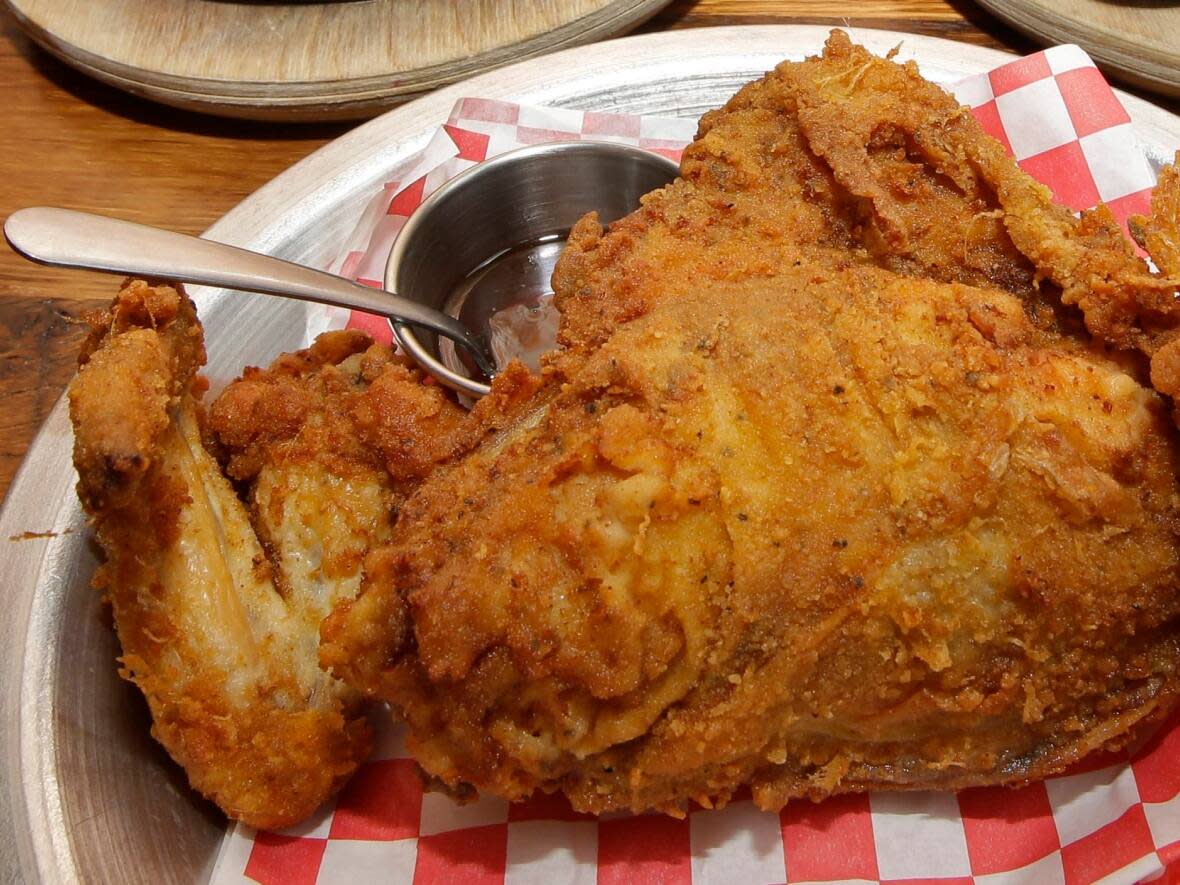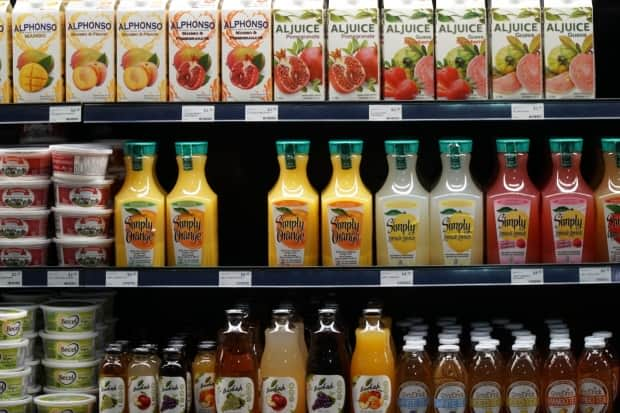Want to avoid ultra-processed foods? Cook more often, choose whole foods

Sandra Elia is intimately aware of how prevalent ultra-processed foods are in the Canadian diet.
As a recovering food addict, Elia struggled for years to control her intake of ultra-processed fried foods, heavy in refined sugar and flour.
She's not alone; Canadians get nearly half of their caloric intake from ultra-processed foods, according to a 2017 study commissioned by Heart & Stroke.
Elia now advocates that everyone consume a diet that contains whole, fresh foods, rather than ultra-processed, "factory-made foods."

"We know for a fact, as our Western diet ripples across the globe, it brings with it all our chronic illnesses," said Elia, who is also board chair and director of patient advocacy and education with Obesity Matters, a non-profit.
Experts agree that ultra-processed foods not only harm physical health — they're also correlated with increased negative mental health, including depression and anxiety.
What are ultra-processed foods?
Humans have processed food ever since we moved past hunting and gathering as our primary means of food acquisition, according to food engineer Hamed Vatankhah.
"We learned that we can process the food, we can [store] the food [longer], we can make changes in our food to make them more palatable," explained Vatankhah, CEO of Montreal-based food engineering company Scipertech.
According to the Nova food classification system — developed by researchers at the University of Sao Paulo in Brazil in 2009 — freshly baked bread, freshly made cheese, salted nuts and bacon are all considered processed, because they contain added salts, sugars and fats to preserve them or to make them more enjoyable.
Nova classifies food based on how much it's been processed, ranging from unprocessed or natural foods to ultra-processed.

Pickling and fermentation are also common food processing methods.
Ultra-processed foods, meanwhile, are radical revisions of natural, whole ingredients, according to Jean-Claude Moubarac, an associate professor at the University of Montreal's department of nutrition.
Moubarac wrote the Heart & Stroke study, which looked at how people in Canada consume ultra-processed foods, as well as how it affects Canadian diets, while also offering policy suggestions aimed at reducing people's reliance on them.
"Ultra-processed foods are formulations of industrial substance and additives that are carefully selected to create a product of consumption," he said in an interview with Dr. Brian Goldman, host of The Dose.
"They have a lot of sugar, salt and fat, but also they have colours, flavours, different types of additives, to make them appealing."
WATCH | Beyond Meat's "healthier" claims challenged by health experts:
Under the Nova system, included in the ultra-processed category are most fast foods, as well as instant macaroni and cheese, flavoured tortilla chips, carbonated soft drinks and chocolate bars.
Even certain brands of breakfast cereal, fruit juices and yogurt count as ultra-processed.
Researchers like Moubarac argue that modern food manufacturers heavily process ingredients to incentivize increased food consumption — not just to ensure food stays fresh longer.
"This is why they put so much sugar and salt, and this is why they use flavour and colours," he said.
"Nature makes food for the purpose of life, and I think [the food] industry makes ultra-processing for the sole purpose of selling, and making profit."
Elia says she knows how appealing ultra-processed food can be.
"Broccoli, salmon, asparagus — I can only eat so much of that, but with the ultra-processed stuff, it only makes me want to have more, very akin to alcoholism."
Like any other food, ultra-processed foods do contain nutrients, vitamins and minerals. However, the issue for experts is that those are often added after processing, and wouldn't otherwise exist in those foods.
"You might find added minerals and vitamins to a breakfast cereal that is loaded with sugar," Moubarac said.
Correlation with negative physical, mental health
Studies show there are correlations between the consumption of ultra-processed foods and health issues like obesity, Type 2 diabetes and heart disease.
"Overall, I would say, the more ultra-processed food is consumed, the less healthy people are," said Moubarac.
There's also a correlation between ultra-processed foods and mental health issues like depression and anxiety.
Still, he acknowledges that the relationship does require more research, as the causation remains unclear — that is, whether depression causes people to over-consume the foods, or if the foods themselves are causing the depression.
Elia says she relied on ultra-processed foods to deal with her feelings of trauma, especially during moments of mental health difficulty.
"What I didn't realize at the time was [that] these ultra-processed foods make my mental health tank," she said. "I feel very depressed and anxious on those foods."
"We know that when people are depressed, they tend to eat a lot of products that are high in sugar, because it does have an effect on their mood," said Moubarac.
"What is clear is that people … lose control over these products now and then," he said.
He said people at home should be mindful of the type of food they eat when they feel stressed or anxious.
Is it possible to completely avoid ultra-processed foods?
For his part, Vatankhah acknowledges that ultra-processing "deteriorates some of the nutritional components of foods," but cautions against the belief that all foods are unhealthy when processed.
"Processed foods guarantee public health," Vatankhah said, pointing to milk pasteurization, which eliminates otherwise harmful microorganisms from raw, organic milk.
Additionally, he says it's made it possible to consume a wider variety of foods, including fruits and vegetables from other parts of the world that would be unavailable in environments like Canada.
Moubarac acknowledges that it can be difficult for some people to avoid ultra-processed foods, and that rising costs can make it difficult to afford certain fresh ingredients, like meat.
WATCH | Food For Thought: Ultra-processed foods:
They're also often more convenient to purchase when people are on the go.
Nonetheless, he suggests that people cook for themselves as often as they can, while focusing on recipes that combine meat and vegetables with grains and legumes.
"If you like chocolate, I would recommend to buy real chocolate, not a KitKat bar, which is candy," he said.
Moubarac also disagrees that ultra-processed foods are cheaper than natural, whole foods, countering that the food industry prices in the cost of the time and energy consumers save by buying ultra-processed foods.

"We can say honestly that meat is expensive, but there are some foods that are much less expensive, such as rice, beans and vegetables," he said.
"If you eat vegetables that are from the season, you'll find that it is much cheaper to buy all those foods and combine them into a meal, than to buy the ultra-processed version."
Elia encourages people who consume ultra-processed foods to consider the benefits of whole, fresh foods.
"I hold much of the blame with the food industry. It's a billion-dollar industry trying to get the greatest share of your wallet."


